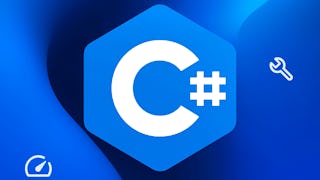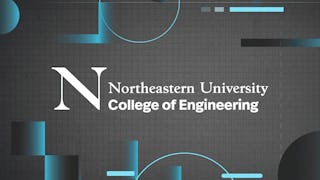- Browse
- Algorithms
Results for "algorithms"
 Status: Free TrialFree TrialU
Status: Free TrialFree TrialUUniversity of Colorado Boulder
Skills you'll gain: Operations Research, Algorithms, Graph Theory, Linear Algebra, Combinatorics, Computational Thinking, Mathematical Modeling, Theoretical Computer Science, Python Programming
Build toward a degree
4.8·Rating, 4.8 out of 5 stars52 reviewsAdvanced · Course · 1 - 4 Weeks
 Status: Free TrialFree TrialU
Status: Free TrialFree TrialUUniversity of Colorado Boulder
Skills you'll gain: Public Key Cryptography Standards (PKCS), Cryptography, Data Structures, Algorithms, Encryption, Theoretical Computer Science, Computer Science, Programming Principles, Computational Thinking, IBM Cloud, Advanced Mathematics
Build toward a degree
4.6·Rating, 4.6 out of 5 stars58 reviewsAdvanced · Course · 1 - 4 Weeks
 Status: Free TrialFree TrialU
Status: Free TrialFree TrialUUniversity of California, Santa Cruz
Skills you'll gain: C++ (Programming Language), Object Oriented Programming (OOP), Programming Principles, Software Design Patterns, Computer Programming, Algorithms, C (Programming Language), Graph Theory, Debugging, Artificial Intelligence, Data Structures, Game Design, Software Documentation
4.5·Rating, 4.5 out of 5 stars9.6K reviewsBeginner · Specialization · 3 - 6 Months
 Status: PreviewPreviewN
Status: PreviewPreviewNNortheastern University
Skills you'll gain: Model Evaluation, Supervised Learning, Statistical Machine Learning, Machine Learning Algorithms, Unsupervised Learning, PyTorch (Machine Learning Library), Applied Machine Learning, Statistical Methods, Statistical Modeling, Machine Learning, Machine Learning Software, Statistical Analysis, Artificial Intelligence and Machine Learning (AI/ML), Regression Analysis, Classification Algorithms, Algorithms, Predictive Modeling, Dimensionality Reduction, Complex Problem Solving
Intermediate · Course · 1 - 4 Weeks
 Status: NewNewStatus: Free TrialFree Trial
Status: NewNewStatus: Free TrialFree TrialSkills you'll gain: Algorithms, Pseudocode, Javascript, Data Structures, Computational Thinking, Performance Tuning, Computer Programming, Solution Design, Object Oriented Programming (OOP), Debugging
Intermediate · Course · 1 - 4 Weeks
 Status: Free TrialFree TrialT
Status: Free TrialFree TrialTTsinghua University
Skills you'll gain: Data Structures, Algorithms, Theoretical Computer Science, Pseudocode, Programming Principles, Computational Thinking, Computational Logic, Computer Science
3.1·Rating, 3.1 out of 5 stars33 reviewsIntermediate · Course · 1 - 3 Months
 Status: Free TrialFree Trial
Status: Free TrialFree TrialSkills you'll gain: Computational Thinking, Algorithms, Program Development, Software Development, Software Engineering, Programming Principles, Data Structures, Computer Programming, Javascript, Computer Science, Web Development
Intermediate · Course · 1 - 4 Weeks
 Status: Free TrialFree TrialU
Status: Free TrialFree TrialUUniversity of California, Santa Cruz
Skills you'll gain: C++ (Programming Language), Go (Programming Language), File I/O, Data Structures, Object Oriented Programming (OOP), Programming Principles, Software Design Patterns, Debugging, Computer Programming, Unit Testing, Algorithms, C (Programming Language), Program Development, Integrated Development Environments, Graph Theory, Software Testing, Artificial Intelligence, Integration Testing, Software Design, Software Documentation
4.5·Rating, 4.5 out of 5 stars9.6K reviewsIntermediate · Specialization · 3 - 6 Months
 Status: Free TrialFree TrialC
Status: Free TrialFree TrialCCodio
Skills you'll gain: Algorithms, C++ (Programming Language), Data Structures, Computer Programming, Computational Thinking, Technical Design
4.5·Rating, 4.5 out of 5 stars11 reviewsIntermediate · Course · 1 - 4 Weeks
 Status: Free TrialFree Trial
Status: Free TrialFree TrialSkills you'll gain: Algorithms, Computer Hardware, Cryptography, Python Programming, Computer Programming, Emerging Technologies, Theoretical Computer Science, Simulation and Simulation Software, Linear Algebra
4.5·Rating, 4.5 out of 5 stars26 reviewsBeginner · Course · 1 - 3 Months
 Status: Free TrialFree Trial
Status: Free TrialFree TrialSkills you'll gain: Data Structures, Algorithms, Computer Programming, Computational Thinking, Theoretical Computer Science, Performance Tuning
4.5·Rating, 4.5 out of 5 stars6 reviewsIntermediate · Course · 1 - 3 Months
 Status: Free TrialFree TrialU
Status: Free TrialFree TrialUUniversity of Colorado System
Skills you'll gain: Routing Protocols, Network Routing, TCP/IP, Network Protocols, Network Architecture, Network Performance Management, Computer Networking, OSI Models, Local Area Networks, Graph Theory, Algorithms
4.7·Rating, 4.7 out of 5 stars455 reviewsIntermediate · Course · 1 - 3 Months
In summary, here are 10 of our most popular algorithms courses
- Approximation Algorithms and Linear Programming : University of Colorado Boulder
- Advanced Data Structures, RSA and Quantum Algorithms: University of Colorado Boulder
- Coding for Everyone: C and C++: University of California, Santa Cruz
- Machine Learning for Engineers: Algorithms and Applications: Northeastern University
- Algorithms and Problem-Solving in JavaScript: Packt
- Data Structures and Algorithms (I): Tsinghua University
- Data Structures and Algorithms: Binary Search: Scrimba
- C, Go, and C++: A Comprehensive Introduction to Programming: University of California, Santa Cruz
- C++: Algorithms: Codio
- Quantum Computing with Qiskit and Advanced Algorithms: Packt










